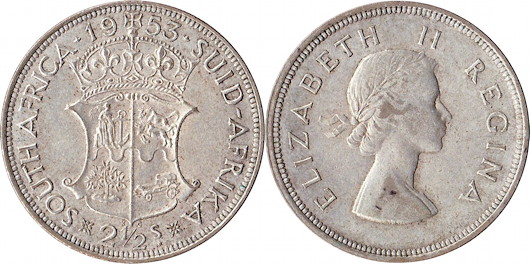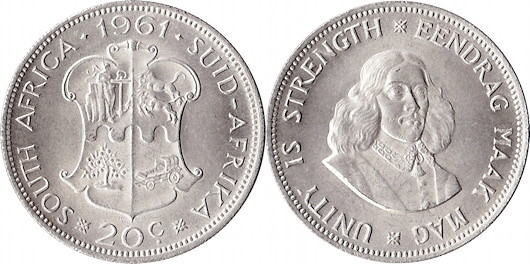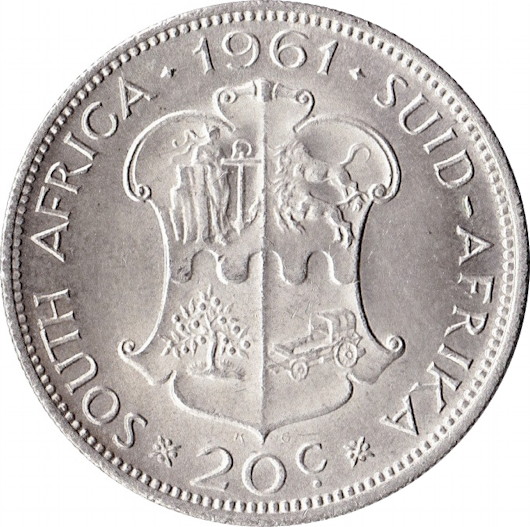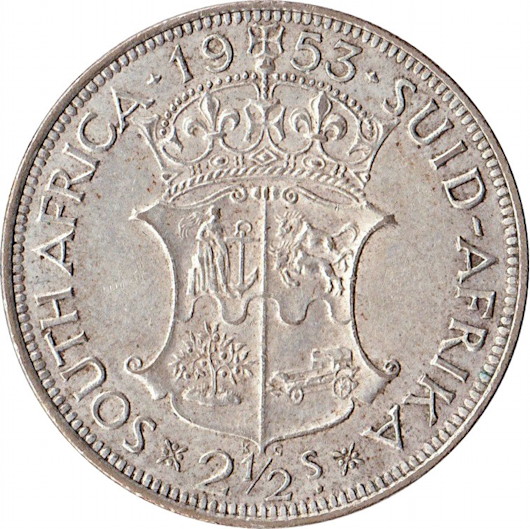London, GB | Formerly of New York, Buenos Aires, Fife, and the Western Cape. | Saoránach d’Éirinn.

About Andrew Cusack
 Writer, web designer, etc.; born in New York; educated in Argentina, Scotland, and South Africa; now based in London.
Writer, web designer, etc.; born in New York; educated in Argentina, Scotland, and South Africa; now based in London. read more
News
Blogs
Reviews & Periodicals
Arts & Design
World
France
Mitteleuropa
Knickerbockers
Argentina
The Levant
Africa
Cape of Good Hope
Netherlands
Scandinavia
Québec
India
Muscovy
Germany
Academica
From Realm to Republic

South Africa’s transition from a monarchy to a republic coincided with a change of currency. Out went the old South African pound (with its shillings and pence) and in came the decimilised rand.
Luckily the republican government had the good taste to commission George Kruger Gray, responsible for the country’s most beautiful coinage, to design the new coins. HM the Queen was replaced by old Jan van Riebeeck, and the country’s arms were deprived of their crown.



Published at 2:30 pm on Wednesday 3 May 2017. Categories: Arts & Culture Design Errant Thoughts History Monarchy South Africa Tags: Coins, History, Monarchy, South Africa.
Search
Instagram: @andcusack
Click here for my Instagram photos.Most Recent Posts
- Amsterdam November 26, 2024
- Silver Jubilee November 21, 2024
- Articles of Note: 11 November 2024 November 11, 2024
- Why do you read? November 5, 2024
- India November 4, 2024
Most Recent Comments
Book Wishlist
Monthly Archives
Categories
Home | About | Contact | Paginated Index | Twitter | Facebook | RSS/Atom Feed
andrewcusack.com | © Andrew Cusack 2004-present (Unless otherwise stated)



Wikipedia states that Gray died in 1943. Had the van Riebeeck portrait first been used on a different coin or medal?
Cusack et al …
And for those of us who were within reach of Springbok Radio during those times, how can we forget the encouraging refrains of “Daan Desimaal die rand-sent man” …
https://www.youtube.com/watch?v=cVhueSJiuYU
« … Daan Desimaal, die rand-sent-man,
Gee jou sente vir pennies net waar hy kan,
Een sent vir ‘n pennie, en twee vir twee,
En twee-en-‘n-half vir ‘n tiekie.
‘n note of silwer bly wat dit was
Ons het net die ander naam daar aan vas
Daan Desimaal, die rand-sent-man,
Gee jou sente vir pennies net waar hy kan,
Drie sent vir twee pennies en vier vir vyf
En vyf sent beteken ‘n sixpence … »
Before decimalisation …
“oortjie” was a “kwartpennie”
A “stuiwer” was a “halfpennie”
A “oulap” was slang for a penny
A “twalap” was slang for two pennies
A “daalder” was one shilling and six pennies or “one & six”
The term “daalder” came from the old riksdaalder, introduced by the Dutch at the Cape.
A “riksdaalder” was worth 15 cents.
In the Afrikaans lyrics, “tiekie” was a thrupenny bit, or “ticky” in South African English.
Dave, thanks for the link!
I would point out that in the Netherlands ‘daalder’ used to refer to f1.50 (one and a half guilder), while a ‘rijksdaalder’ was a f2.50 piece. Since you say in South Africa, ‘daalder’ referred to 1/6 I think ‘daalder’ and ‘rijksdaalder’ must have come to South Africa separately as well. Was the latter ever a term used for half-a-crown, by any chance?
JD …
I do not remember anything but « half-kroon » being used for 2/6 (two shillings and sixpence — half-a-crown). But my environment was always a very English-dominant culture … first Johannesburg and then the Copperbelt of Northern Rhodesia (even though in the latter the white population was nearing 40% Afrikaner!). Perhaps in the Cape, the Orange Free State and parts of the Transvaal outside of the Johannesburg area there may have been other terms for a half-a-crown).